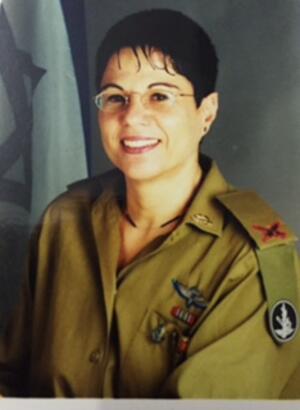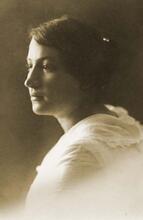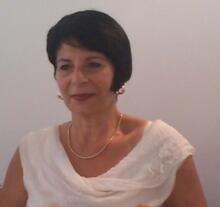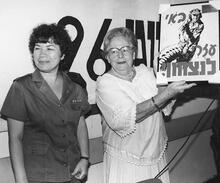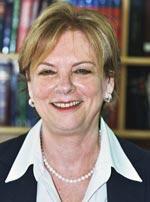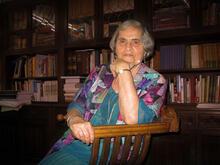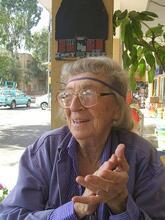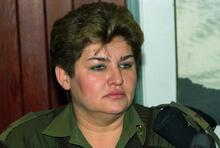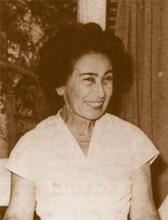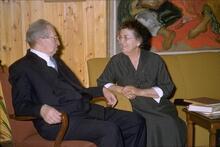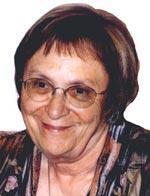Suzy Yogev
Suzy Yogev, date unknown
From Wikimedia Commons.
The daughter of Jewish immigrants from Istanbul, Suzy Yogev was born on January 23, 1958, on Moshav Neve Yamim. She entered the Israel Defense Forces in 1976 and became OC (Officer Commander) of the IDF’s Women’s Corps in 2000. Yogev was serving as OC of the Women’s Corps when the Women’s Corps disincorporated in 2001. Following this structural change, she became the first Adviser to the Chief of Staff on Women’s Issues. During this transitional period, Yogev worked to ensure that accommodation for female soldiers in the military happened across the IDF in a way that maximized efficiency while retaining sensitivity to gender issues.
Military Career
Suzy Yogev, who began her military service in the IDF in 1976, was women’s officer in the military police and in military intelligence before becoming head of women officers training (1997–2000). On May 14, 2000, she became the commanding officer of the Women’s Corps (see “CHEN”) at the rank of Brigadier General, and in 2001 she was appointed Advisor to the Chief of Staff for Women’s Issues—a position that replaced that of OC Women’s Corps when the Corps was abolished as a separate military unit. Indeed, Yogev may be said to have been instrumental in changing not only the name but also the role of women serving in the IDF, in keeping with principles of equality and equal opportunity, since she led the process of establishing the position of Advisor as a special role within the General Staff. In this position she was influential in furthering women’s activities in all frameworks—compulsory service, reserve duty, and professional service. Thus she was a key figure in unifying training, raising the level of marksmanship, approximating the selection of women combatants with that of men, and establishing tests for promotion to officer rank.
The guiding principle of the change in both conception and structure of the Women’s Corps was a switch from caring for the individual and empowering the women to formulating the military’s policy on everything related to women’s service. This was accomplished by dispersing the various commanding roles and transferring them in toto to (male) commanding officers, changing activity vis-à-vis the General Staff and senior officers to an advisory function rather than the function of commanding officer of a military unit. This involved creating, developing, and heading a focal point of knowledge on women in general and servicewomen in particular.
During Yogev’s term of office, which ended in 2003, present and past Chiefs of Staff, heads of the Manpower Division, and other officers were enlisted to support the transformation in structure and purpose of the Women’s Corps and its transfer to the General Staff as a center of gender knowledge, with an unbounded integration capacity on the one hand, and, on the other, with a distinct proactive policy—all supported by organizational and personnel resources dedicated to advancing women and maximizing their potential.
Personal Life and Education
Yogev (née Levi) was born on Moshav Neve Yamim near Kefar Sava on January 23, 1958. She has two sisters: Noa (b. 1959) and Leor (b. 1972). Her father, Meir (b. 1931), a metal-worker, immigrated to Israel from his native Istanbul in 1949. Her mother, Victoria (née Azarya, b. 1939), also from Istanbul, arrived a year later. They married in 1956 and divorced in 1979. Victoria became the head of the Youth, Culture and Sport Department of the regional authority. In her youth, Yogev was a member of Gadna, the voluntary Israeli youth organization that prepares Israelis for military service before their conscription. In 1981, Suzy married Moshe Yogev (b. 1958), an officer in the IDF. The couple had two sons—Tomer (b. 1983) and Nadav (b. 1986)—before divorcing in 2000.
Yogev, who holds a B.A. in Land of Israel Studies and History from Bar-Ilan University and an M.A. degree in Political Science from the University of Haifa, is also a graduate of the IDF Staff College and of the paratrooper training course. Since retiring from the IDF in 2003, Yogev has been Deputy Director of Customer Services of Hot Television. In addition, she fulfills various voluntary positions. Since 2004 she has been the chairwoman of the board of the Adler Institute for Family Guidance and is a member of the board of directors of the Advisory Council for preparing the Petroleum Law. Since July 2005 she has been a member of the Committee for Education and Prevention of Drug Use amongst Olympic sportspeople in Israel and a member of the committee dealing with shortening the army service for draftees.
Golan, Avirama. “Arms and the Woman.” Ha’aretz. September 20, 2001. https://www.haaretz.com/1.5399028. Accessed July 18, 2020.
Mualem, Mazal. “Women’s Corps Disbands.” Ha’aretz. September 8, 2001. https://www.haaretz.com/1.5367073. Accessed July 18, 2020.
“New Combat Opportunities for Women in the IDF.” Israelnationalnews.com. December 17, 2002. http://www.israelnationalnews.com/News/Flash.aspx/35614. Accessed July 18, 2020.
Dromi, Uri, ed. Women in the Israel Defense Forces. The Israel Democracy Institute, Jerusalem, November 21, 2002. Jerusalem: The Old City Press. https://en.idi.org.il/media/6221/armywomen.pdf. Accessed July 18, 2020.

